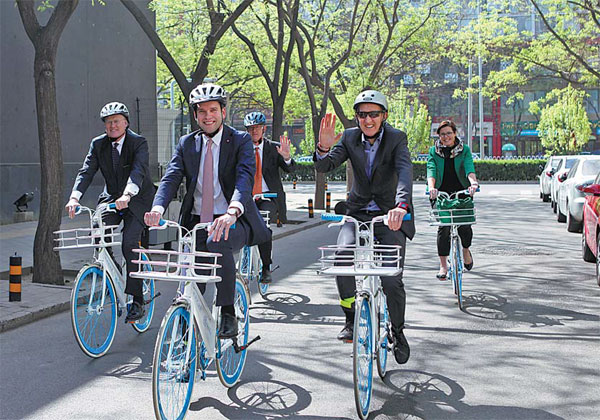What's news

| Swedish Minister for Health Care, Public Health and Sport Gabriel Wikstrom (second from left), along with Swedish Ambassador to China Lars Freden (first left) and World Health Organization Representative Bernhard Schwartlander (right), ride bikes to a meeting at the WHO offices in Beijing to promote good health and environmental protection. More than 80 percent of Chinese adolescents do not get enough physical activity, a major risk factor in obesity and the development of chronic diseases. Zou Hong / China Daily |
Xi looks to bolster South Asia ties
President Xi Jinping extended the prospects of further cooperation to the entire subcontinent on April 21, a day after China and Pakistan cemented their close partnership with landmark agreements.
China is the largest neighbor of South Asian countries, and a peaceful and stable South Asia is in China's interests, Xi said while addressing a joint session of the Pakistani Parliament.
South Asia is a key point for China's Silk Road Economic Belt and 21st Century Maritime Silk Road initiatives, Xi said.
The China-Pakistan economic corridor and another such corridor running through China, Bangladesh, Myanmar and India are closely related to these initiatives, he said.
China sees South Asia as a key area for its western regions to open up to, the president said, adding that the two corridors will boost growth and regional cooperation.
State Council acts to add jobs
The State Council issued a series of measures on April 21 to stimulate employment, including expanding taxation reduction and exemption policies to cover sole-proprietorship enterprises. The State Council is the highest executive organ of the national government in China.
The decision was made at the council's weekly executive meeting, presided over by Premier Li Keqiang.
A news release after the meeting said: "Faced with growing pressure on employment this year, we have to launch more active employment policies and give full support to mass entrepreneurship and innovation."
According to the National Bureau of Statistics, 3.2 million new jobs were created in urban areas in the first three months of the year, a year-on-year drop of 240,000.
The decision from the meeting was that companies hiring people who have been jobless for more than six months would receive tax advantages. Previously, this policy only covered those who had been unemployed for more than a year. Taxation reduction and exemption policies would be expanded from benefiting only small businesses started by graduates or registered jobless people to covering all sole-proprietorship enterprises.
Indonesia to share Silk Road benefits
China welcomes Indonesia to "share the fruits" of the Maritime Silk Road, the Chinese ambassador to Indonesia said as President Xi Jinping arrived on April 21 for his second visit to the archipelago within one and a half years.
Xie Feng, China's ambassador to Indonesia, said Beijing appreciates Jakarta's commitment to join the Asian Infrastructure Investment Bank as a founding member.
"And we are also happy to see Indonesia's application to adopt policy and financial support under the One Belt, One Road strategy," he said, noting China's 21st Maritime Silk Road initiative complements Indonesian President Joko Widodo's "maritime axis" ambition and his plans to build ocean highways.
Foreign investment curbs cut for FTZs
China has cut the number of restrictions on foreign investment for new pilot free trade zones in Tianjin, Guangdong and Fujian, and also for the zone in Shanghai.
Assistant Commerce Minister Wang Shouwen said on April 20 all such zones would implement a unified and friendlier business environment for foreign investment.
To increase transparency, the central government has made public a "negative list" of foreign investment applicable to the four zones. For the Shanghai zone, the number of restricted items on the list has been cut to 122 from 139 last year.
A master plan has been unveiled for the zones in Tianjin, Guangdong and Fujian, and the development plan for the Shanghai zone has been upgraded to create a wider platform for economic reform and opening-up.
Migrant life linked to youth crime
The structure of migrant families in China is more likely to contribute to juvenile crimes, an education report said.
"There were important links between family factors and juvenile crime. Bad family structure, an improper method of family education, and a poor family economic and cultural environment were the key factors causing delinquent minors," said the report, released by the 21st Century Education Research Institute on April 20.
It analyzed China's education reform in 2014, including migrant children's education, admission reform in elementary and middle schools, reform of the national college entrance exam and new policies to improve vocational education.
"About 36.7 percent of juvenile criminals neither go to school nor work, 27.3 percent are children who are left at home when parents work as migrant workers in cities, and 26.9 percent are children from migrant families traveling with their parents to the cities," said Zhang Liangxu, vice-director of the China Youth and Children Research Center.
Property register to be consolidated
China will merge its property registration agencies before the end of the year, according to central government departments.
Implementing the provisional property registration regulation, which has been effective for nearly two months, requires government bodies that now carry out such registration works to consolidate, the Ministry of Land and Resources and the State Commission Office for Public Sector Reform said in a statement.
The two departments have issued guidelines that request local governments at or above county-level to retrieve registration functions from different government agencies and select one of these agencies to take on the task.
Currently, a wide range of government bodies registers properties such as commercial and residential real estate and farmland.
"So far, 27 out of 32 provincial level regions in the mainland have consolidated their provincial registration departments," the Ministry of Land and Resources' Property Registration Bureau said.
"But when it comes to lower level places, only 151 out of 3,100 cities and counties have done the work, which means more than 95 percent of them have yet to begin the consolidation."
Lowering reserve ratio to boost growth
China's central bank announced that it was lowering the amount of cash that all financial institutions need to reserve starting on April 20.
The move will release liquidity of at least 1.2 trillion yuan ($197 billion) to support economic growth.
It is the second reserve requirement ratio cut in three months. The 1 percentage point drop was the largest since November 2008.
An extra 1 percentage point cut in the ratio will be given to commercial banks for agricultural services and an additional reduction of 2 percentage points to the Agricultural Development Bank of China, according to the People's Bank of China.
It will further lower the ratio by 0.5 percentage points for eligible banks that lend a certain amount of money to agricultural borrowers or to small and micro businesses.
Li urges banks to boost lending
Chinese banks should further cut their fees and increase their loans to small businesses, Premier Li Keqiang said in a meeting with presidents of major Chinese banks and their administrators in Beijing.
Li said the banks should also dedicate more financing to development projects to foster domestic restructuring and to support cooperation with developed economies, both as a buyer of technology and expertise, and as an exporter.
The premier visited China Development Bank and the Industrial and Commercial Bank of China before hosting the meeting together with Vice-Premier Ma Kai and State Councilor Yang Jing at the ICBC.
Li urged the CDB to increase its support for shantytown renovation projects, including underground pipe networks; railway construction; water conservancy work; and information infrastructure projects.
Rail bridge to Russia ready in 2016
The Chinese section of a cross-river railway bridge linking the country with Russia will be completed by the end of this year, according to project managers.
"Construction for the Tongjiang-Nizhneleninskoye Railway Bridge's main body will be finished before the end of this year. We will start building its auxiliary facilities next year," said Lin Yonghan, a project manager at the China Railway Major Bridge Engineering Group. "More than 700 workers are racing against time in two shifts to meet the project's timetable."
Meanwhile, Russian Prime Minister Dmitry Medvedev has asked Russia's transportation authority to begin construction work on the bridge's Russian section before May, China News Service quoted Russian media as reporting.
Designed to have an annual cargo capacity of 21 million metric tons, the bridge, which crosses the Heilongjiang River, known as the Amur River in Russia, will connect Tongjiang city in Heilongjiang province with Nizhneleninskoye in Russia's Jewish Autonomous Oblast.
Budgets cut further in frugality bid
Government budgets for overseas travel, official vehicles and receptions will be reduced by 11.7 percent this year to promote frugality, the Ministry of Finance said.
It said 6.31 billion yuan ($1.03 billion) has been allocated to cover expenses related to these three categories.
The budget for government vehicles, which has been cut by 16.2 percent year-on-year due to government reforms introduced last year to reduce unnecessary spending on transportation, is the biggest contributor to the overall reduction.
Last year, China spent 6.56 billion yuan on overseas trips, vehicles and receptions.
Official investigated over desert pollution
An official in charge of environmental protection is being investigated after a company was allowed to pollute the desert with untreated sewage in Gansu province, according to the Supreme People's Procuratorate.
Prosecutors released a notice on April 21 saying that Wen Wu, deputy director of the environmental protection bureau of Wuwei's Liangzhou district, was under investigation.
The notice stated that Wen didn't report and deal with the pollution in a timely manner, even though he knew a local company was illegally discharging pollutants into the Tengger Desert from June to January.
| People put baskets carrying 9,333 eggs and 33 kg of shepherd's purse into a huge pot 3.3 meters in diameter on April 21, the third day of the third month of the lunar calendar, in Hongjiang, Hunan province. Under a local tradition, eggs and shepherd's purse are cooked together and eaten on that day to prevent illness. Zhou Qiang / For China Daily |
(China Daily European Weekly 04/24/2015 page2)
Today's Top News
- Japan tempting fate if it interferes in the situation of Taiwan Strait
- Stable trade ties benefit China, US
- Experts advocate increasing scope of BRI to include soft power sectors
- New engine powers cargo drone expansion
- China to boost green industry cooperation
- Manufacturing PMI rises in November
































